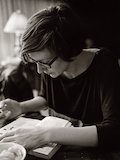[And, having been considered only locally a sinner]
by Katie Berta
And, having been considered only locally a sinner, I thought, even if I am
evil, no one has to know, best to stay out of the news. And, keeping my head
down, I sewed my corruption on the down low, making it very personal and
ambiguous, so as to avoid being served legal papers or included on an Excel
spreadsheet of the despicable. And for a time, that was good, and I loved my
life, drunk on my minor crimes and on a sort of gluttony they slaked. Liked it,
until I started having that feeling, like I was being observed. If by no one else,
then by myself, me, who—include this amongst the sins—is historically the
most judgmental observer. And feeling an eye upon me made me wonder about
god, if only lazily, and made me cringe away from everything that previously
gave me joy (subversive naps in the middle of what should have been a workday,
aforementioned judgment, et cetera) and before long everything was quivering,
vibrating with a sort of tension we all shun, the kind that is uncomfortable for
us all. And so I had to strip my life down to the studs, taking the walls off and
the electricity out and the dog to the pound. And once I was done, all I could
do was stare off into space as others talked to me, all I could do was rest in the
space where I should have been talking, like a computer’s little wheel, spinning
as it thinks, waiting for someone to move me back in.
This poem was written as a part of my manuscript in progress, a novel in verse about a woman who is part of a cult or commune. In particular, it’s a flashback to the time before the speaker joined the cult and is meant provide psycho-emotional context for how she ended up there. One of the poem’s main mechanisms is delaying disclosure of which sins the speaker is referring to—or what she considers a sin. Not knowing what she’s done hopefully develops tension in the reader—and when we get the list of those sins (“subversive naps in the middle of what should have been a workday, aforementioned judgment, et cetera”) we experience relief, or even experience it as humorous. It ends up being a poem about irrational guilt rather than a poem about being actually bad—and, hopefully, it helps the reader gets a sense of why this speaker wanted to escape her life.
 Katie Berta is the managing editor of The Iowa Review. Her poems have appeared or are forthcoming in Ploughshares, The Cincinnati Review, Kenyon Review Online, Prairie Schooner, The Yale Review, The Massachusetts Review, and Black Warrior Review, among other magazines. You can find her book reviews in The American Poetry Review, West Branch, Harvard Review, Ploughshares, and elsewhere. She has received a residency from Millay Arts, fellowships from the Vermont Studio Center and the Virginia G. Piper Center for Creative Writing, and an Iowa Review Award.
Katie Berta is the managing editor of The Iowa Review. Her poems have appeared or are forthcoming in Ploughshares, The Cincinnati Review, Kenyon Review Online, Prairie Schooner, The Yale Review, The Massachusetts Review, and Black Warrior Review, among other magazines. You can find her book reviews in The American Poetry Review, West Branch, Harvard Review, Ploughshares, and elsewhere. She has received a residency from Millay Arts, fellowships from the Vermont Studio Center and the Virginia G. Piper Center for Creative Writing, and an Iowa Review Award.